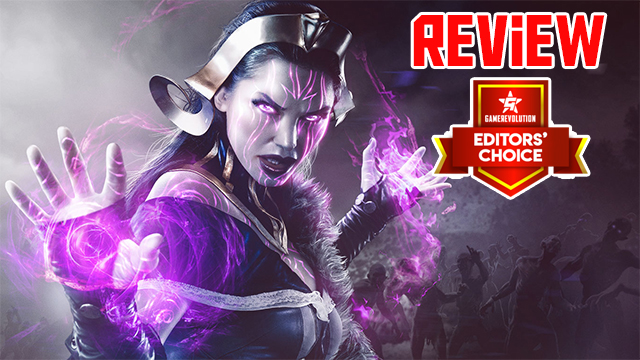It would be a fool’s errand to review Magic: The Gathering. The mother of all card games has been going strong for over 25 years, all the while increasing in complexity. It is like chess, only each player brings their own set of pieces. Even when limited to the Standard environment, a place where only the last handful of sets are legal, there are endless possibilities and hundreds of bespoke cards to consider. This type of game has traditionally been difficult to translate to the digital realm in a way that made sense. From beginner-focused products to a truly insane Xbox strategy game, there have been plenty of attempts. With the latest, called MAGIC: THE GATHERING ARENA, Wizards of the Coast finally struck the right balance and all it took was translating the game over without any caveats.
Magic: The Gathering Arena Review | Arriving on Dominaria
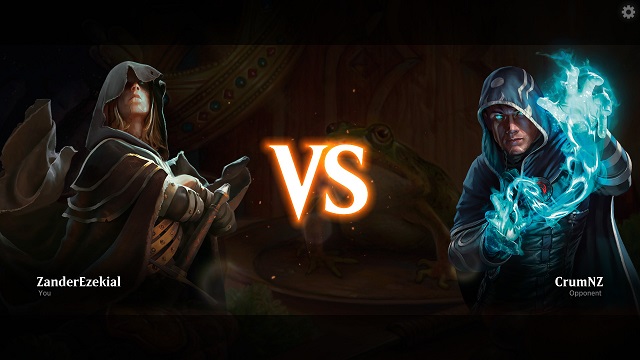
For those who’ve never played Magic before, here’s a brief primer. Designed as a short game to play between sessions of Dungeons and Dragons, Magic spellcasts you as a planeswalker, a mystical being who can move between realities. Each round of MTG is like a wizard’s duel, with players building out a set of spells that work in conjunction to chip away at their opponent’s life points. Each new set introduced new ways to play, refined the roles of specific cards, and sanded off the rough edges. What exists decades later is a masterful game that allows for role-playing in a quick, compact experience. In Magic Arena, that same rapid-fire experience is always at your fingertips.
Those are not just buzzwords. Getting into a game is as simple as loading up the program, selecting a deck, and hitting a button. There are alternate ways to play and ranks to climb if you’re serious, but Arena excels at getting you into the game quickly and easily. I won’t even dare mention the number of times I’ve sat down at my computer to do one thing or another and ended up playing five games to test out a new combo instead. Playing on Arena takes out the legwork and headaches, letting players enjoy the mechanics as intended.
Magic: The Gathering Arena Review | Playing with Haste
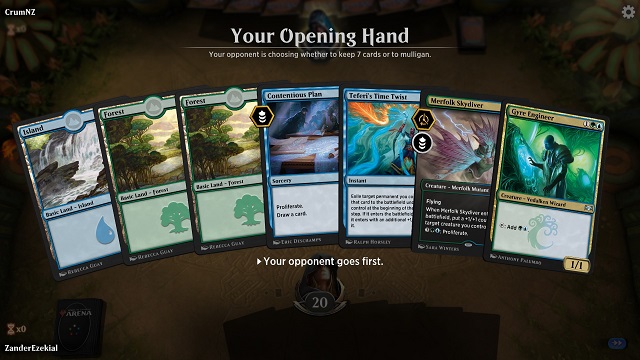
For the most part, players you’ll face online don’t cause headaches either. Sure, you’ll run into distracted opponents who fail to react when a round begins, but those experiences start to go away as you rank up. If you prefer playing casually, just prepare yourself to wait through awkward pauses before your opponent realizes it’s their go. The emote system lets you clue them in, but it can still be pretty annoying to load in with a great opening hand only to find someone who’s not paying attention. It’s not a situation the developers can fix, but it’s worth bringing up as a pretty consistent part of my experience with this game.
Even with some slow players in tow, this is the swiftest iteration of digital Magic ever. Previous translations like Magic Duels featured clunky deckbuilding layouts and slow-moving gameplay. You had to click on cards to play them rather than the more natural drag motion, and the game didn’t specify when card abilities fired off. With Arena, all these inconsistencies phase out of existence. It’s never been easier to get a grasp on spell timing or complicated plays. Not only does Arena play smoothly, but it might also wring a few bad habits out of veteran players.
Magic: The Gathering Arena Review | No Smothering Tithe here
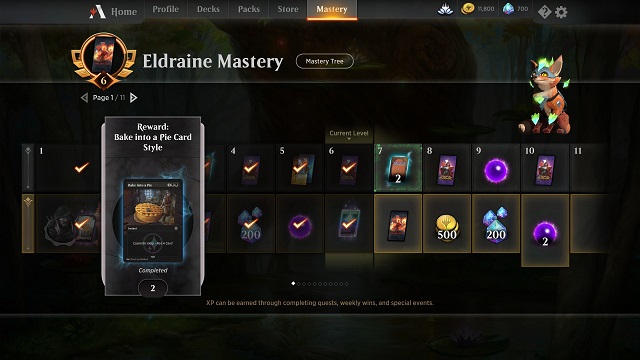
While Arena has plenty to offer everyone, it also caters to newbies who’ve never opened a booster. Every card has tooltips explaining keyword mechanics, so you’ll never confuse Flying with Frenzy. Since Arena also forbids illegal moves, it’s rather easy to learn as you go through context. Just pick up what you need from the lengthy tutorial and start absorbing the strategy. You even get an assortment of starter decks that do a great job of showcasing archetypes while also allowing for deckbuilding freedom. You get some of the building blocks alongside cards that merit replacing with better options. In that way, you learn that building your own stack of 60 cards is sometimes more fun than dueling.
Since Magic: The Gathering Arena is a free game, there’s always the worry that it can be too stingy for free players. After a rough start to its monetization, the developer struck a good balance that fits just about everyone. Even if you’re playing for free, you get plenty of single cards and full packs, along with enough gold to buy more packs if you’d like. The same gold will also buy you into drafts, events where you pick cards from opened packs to build a temporary deck. Win or lose, you keep whatever cards you pick and usually get packs as a reward for playing.
Magic: The Gathering Arena Review | Belle of the Brawl
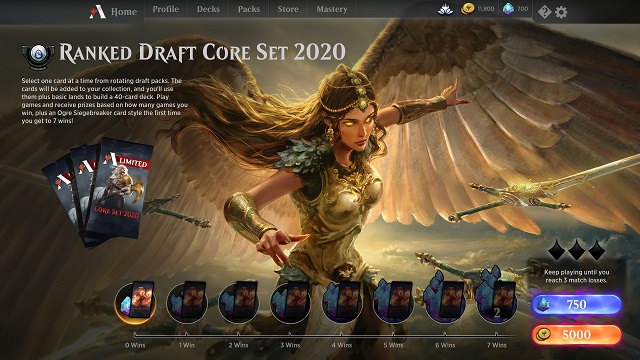
Opening packs generates wildcards that let you pick up cards you haven’t collected yet. In this way, you can work around the random booster packs and build decks just as you want to. Wildcards come at a good pace and can also pop up in packs at all rarities. By the time you gain your footing, you’ll already have a collection big enough to give you options on how you want to build. The battle pass-esque Mastery System will net you more cards and currency, but it feels like a bonus for dedicated players rather than a required purchase. And that’s how it should work.
But the one hurdle in Magic Arena comes in how it chooses to rotate special events in and out. Other than drafting, there’s no standard “brawl” type gameplay to take part in on the regular. These experiences are limited-time events, often occurring over the course of a single weekend before disappearing. Considering that drafting costs currency, it’d be nice to always have an option to jump into something out of the ordinary for free, especially if you’ve already completed all your daily and weekly challenges. It’s also a shame that non-Standard sets will not make the jump into this product, meaning that Arena players will technically get an incomplete MTG experience in the long run. All of this could easily be patched in in the future and hopefully they find their way into the game sooner rather than later.
Magic: The Gathering Arena Review | Finale of Promise
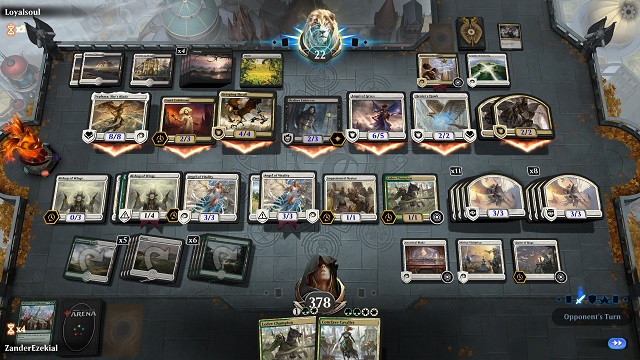
No matter what you end up playing, Magic Arena does a great job of going the extra mile in making the cards come to life. Many creatures and enchantments have specific animations and sounds tied into playing them, bringing you into the fantasy without getting in the way of gameplay. These animations are similar in quality to other card games on the market, but carry more weight because they depict creatures and archetypes that stood the test of time. Even cards that don’t have these perks come with a stellar piece of fantasy artwork. It’s easy to spend time just browsing through the cards on the collection screen, making tiny connections and building out each set’s setting and story.
After a year in beta, Magic: The Gathering Arena has worked out all of its problems. It’s an excellent entry point into the long-standing card game and a more complex alternative to titles like Hearthstone. Wizards has put its full support behind the product, matching release dates with paper sets and planning for the future. It seems like the perfect way to get back into Magic after a long time away, and it’s way cheaper than buying real boosters. Other TCGs have had their day, but it’s hard to see any of them surviving in this Arena going forward.
GameRevolution reviewed Magic: The Gathering Arena on PC over the course of its yearlong beta period. The game is currently available via its own executable and will launch on the Epic Games Store this Winter.
-
Addictive gameplay that keeps you coming back.
-
Fast-paced rounds with approachable complexity.
-
Fair free-to-play model with plenty of opportunities to collect.
-
A serious lack of Beebles, Atogs, and Bands With Other.
-
Brawl-style gameplay is limited to short events.
-
Timer for inactive players can go on for quite a while.
